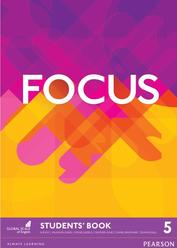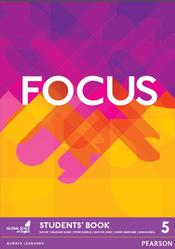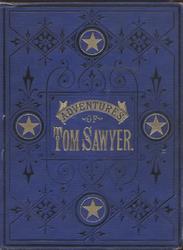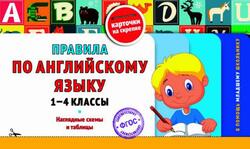What Is Good Writing, Huck G.J., 2015.
Фрагмент из книги:
Although trained in theoretical linguistics, I found myself a number of years ago teaching in and coordinating a professional writing program in a large public university. As a neophyte writing program administrator, I was intrigued to discover that the teachers and scholars in the program hadn’t collectively settled on an answer to the question that serves as the title of this book. Indeed, they seemed surprised that the question should even be asked, the prevailing attitude being that it’s natural for people to differ about what the “good” in good writing refers to, since it’s inevitably a matter of taste. And at any rate, they felt an educator’s professional concern should be more about improving whatever skills students brought to class rather than worrying about something so abstract. There were personal opinions, of course—some quite strongly held—and I was treated to lively discussions about types of pedagogy that might be more or less useful in the writing classroom. I read articles in College English, WPA Journal, and College Composition and Communication (CCC) as an outsider, but with interest.
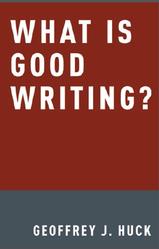
A Cognitive Approach to Good Writing.
The approach to answering the question in my title that I adopt will, I hope, impress the reader as more intuitively plausible than the alternatives, though I recognize that its plausibility is not in itself a decisive strike in its favor. The judgment should rightly rest on whether it delivers results for those who aspire to be good writers. However, results over the short term may be difficult to discern, since, as I will argue, building writing fluency in one’s brain is not a short-term enterprise. As for the longer term, I know of nothing in the way of current research that provides a persuasive basis for choosing any one of the several common pedagogies over another, much less one that establishes a reasonable criterion for success that any new approach must meet. Although there have been many well-designed experiments that attempt to provide empirical proof of the effectiveness of one or another compositionist strategy, the evidence is not very compelling. If gains are observed in an experiment that demonstrates students have learned to write to specific standards involving proxies for good writing — such as evidence of adherence to certain rules of spelling, punctuation, grammar, structure, or argument, or of having written for multiple purposes and audiences or having explored the concept of intellectual property and evaluated sources for credibility, etc. — in which they have been instructed, then the strategies used to teach the procedures may be considered effective for those particular standards, though it has not been demonstrated that the strategies promote anything so broad and subjective as, say, good writing.
Contents.
Preface.
Abbreviations.
Prologue.
Part one Conceptual introduction.
1. Historical Background.
2. A Cognitive Approach to Good Writing.
Part two Fluency.
3. Constructional Fluency.
4. Pragmatic Fluency.
5. Narrative Fluency.
6. Graphemic Fluency.
Part three Form and content.
7. Figurative Language.
8. Surprise, Repetition, and Complexity.
9. Verbal Art and Craft.
Conclusion.
Epilogue.
Notes.
Bibliography.
Index.
Бесплатно скачать электронную книгу в удобном формате, смотреть и читать:
Скачать книгу What Is Good Writing, Huck G.J., 2015 - fileskachat.com, быстрое и бесплатное скачивание.
Скачать pdf
Ниже можно купить эту книгу, если она есть в продаже, и похожие книги по лучшей цене со скидкой с доставкой по всей России.Купить книги
Скачать - pdf - Яндекс.Диск.
Дата публикации:
Теги: учебник по английскому языку :: английский язык :: Huck
Смотрите также учебники, книги и учебные материалы:
Следующие учебники и книги:
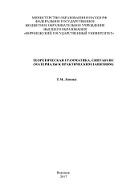 Теоретическая грамматика, синтаксис, Ломова Т.М., 2017 — Представленные в настоящем учебном пособии задания и упражнения помогут в освоении второй части курса Теоретическая грамматика английского языка (синтаксис), познакомят … Книги по английскому языку
Теоретическая грамматика, синтаксис, Ломова Т.М., 2017 — Представленные в настоящем учебном пособии задания и упражнения помогут в освоении второй части курса Теоретическая грамматика английского языка (синтаксис), познакомят … Книги по английскому языку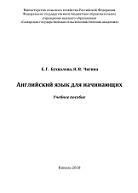 Английский язык для начинающих, Бухвалова Е.Г., Чигина Н.В., 2018 — Учебное пособие включает базовый материал по фонетике, грамматике и лексике английского языка в соответствии с его современными нормами. Комплексный характер … Книги по английскому языку
Английский язык для начинающих, Бухвалова Е.Г., Чигина Н.В., 2018 — Учебное пособие включает базовый материал по фонетике, грамматике и лексике английского языка в соответствии с его современными нормами. Комплексный характер … Книги по английскому языку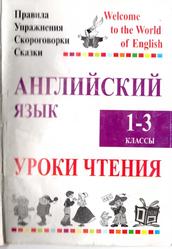 Английский язык, уроки чтения, 1-3 класс, правила, упражнения, скороговорки, сказки, Сушкевич А.С., 2003 — Английский язык, Уроки чтения, 1-3-й класс, Правила, упражнения, скороговорки, сказки, Сушкевич А.С., 2003. Книга представляет собой пособие по обучению чтению … Книги по английскому языку
Английский язык, уроки чтения, 1-3 класс, правила, упражнения, скороговорки, сказки, Сушкевич А.С., 2003 — Английский язык, Уроки чтения, 1-3-й класс, Правила, упражнения, скороговорки, сказки, Сушкевич А.С., 2003. Книга представляет собой пособие по обучению чтению … Книги по английскому языку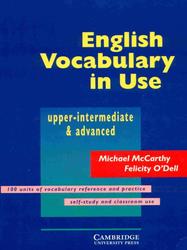 English Vocabulary in Use, Upper-Intermediate, Book with Answers, McCarthy M., O`Dell F., 2017 — The words you need to communicate with confidence. Vocabulary explanations and practice for upper-intermediate level (B2) learners of English. Perfect … Книги по английскому языку
English Vocabulary in Use, Upper-Intermediate, Book with Answers, McCarthy M., O`Dell F., 2017 — The words you need to communicate with confidence. Vocabulary explanations and practice for upper-intermediate level (B2) learners of English. Perfect … Книги по английскому языку
Предыдущие статьи:
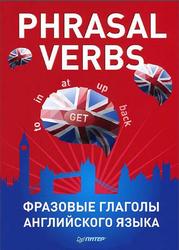 Фразовые глаголы английского языка — Фрагмент из книги: To set ставить, устанавливать. After breakfast, mother set about her household duties. После завтрака мама приступила к … Книги по английскому языку
Фразовые глаголы английского языка — Фрагмент из книги: To set ставить, устанавливать. After breakfast, mother set about her household duties. После завтрака мама приступила к … Книги по английскому языку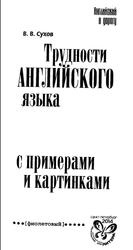 Трудности английского языка с примерами и картинками, Сухов В.В., 2014 — Знание иностранных языков стало практически обязательным в современном мире. Изучение одной лишь грамматики не позволит вам уверенно общаться с носителями … Книги по английскому языку
Трудности английского языка с примерами и картинками, Сухов В.В., 2014 — Знание иностранных языков стало практически обязательным в современном мире. Изучение одной лишь грамматики не позволит вам уверенно общаться с носителями … Книги по английскому языку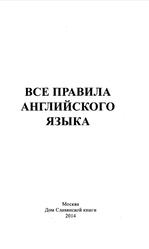 Все правила английского языка, Михалев С.В., 2014 — Справочник содержит всю наиболее важную информацию по английской грамматике. Материал поделен на два раздела. Первый краткий раздел в основном представлен … Книги по английскому языку
Все правила английского языка, Михалев С.В., 2014 — Справочник содержит всю наиболее важную информацию по английской грамматике. Материал поделен на два раздела. Первый краткий раздел в основном представлен … Книги по английскому языку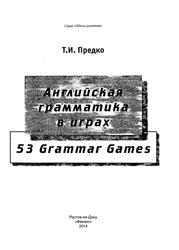 Английская грамматика в играх, 53 Grammar Games, Предко Т.И., 2014 — Обучение грамматике английского языка посредством игр является одним из самых интересных, увлекательных и эффективных методов. Наиболее эффективными играми в процессе … Книги по английскому языку
Английская грамматика в играх, 53 Grammar Games, Предко Т.И., 2014 — Обучение грамматике английского языка посредством игр является одним из самых интересных, увлекательных и эффективных методов. Наиболее эффективными играми в процессе … Книги по английскому языку

